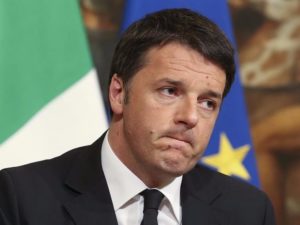by WorldTribune Staff, December 5, 2016
The European Union and the Western “establishment”, still reeling from Brexit and the Trump revolution, suffered another major blow on Dec. 4 as Italy overwhelmingly shot down Prime Minister Matteo Renzi’s referendum on constitutional reform.
Renzi, who came to power in 2014, said he took full responsibility for the “extraordinarily clear” defeat, with the final count showing the “No” camp winning 59.1 percent to 40.9 percent.

“The experience of my government ends here,” Renzi said in a televised address to the nation.
Renzi was to hand in his resignation to President Sergio Mattarella on Dec. 5. Mattarella is now charged with brokering the appointment of a new government, or if that fails, calling early elections.
Renzi, the head of the center-left Democratic Party, had staked his future on the constitutional reform, which was aimed at streamlining Italy’s legislative process by weakening the powers of the upper house, cutting down the number of senators and cutting the powers of regional authorities.
The “No” campaign was spearheaded by the populist Five Star Movement, which took advantage of Renzi’s declining popularity, a struggling economy and concerns caused by tens of thousands of migrants arriving from Africa.
EU leaders, meanwhile, tried to calm the storm by downplaying the significance of the vote in Italy.
EU finance commissioner Pierre Moscovici told reporters in Brussels that he has “full confidence in Italian authorities to manage this situation. I’m very confident in the capacity of the eurozone to resist all kind of shocks.”
German finance minister Wolfgang Schaeuble said Italy should continue the economic reforms begun by Renzi, adding that investors should be relaxed about the Italian referendum, which was a domestic issue, and said he saw no grounds for there to be a crisis for the euro currency.
“I think we should see the situation in Italy with a certain calmness,” he said, adding: “I think there is no need to talk about a euro crisis.”
